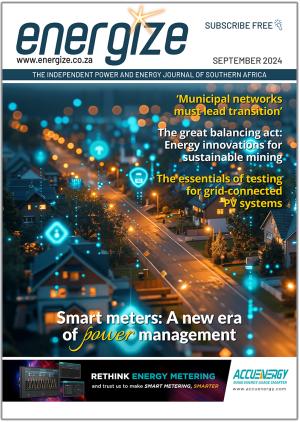by Michael Straeuli, Webber Wentzel
If South Africa were to experience a total grid collapse, parties to a contract may be able to invoke force majeure clauses, or if no such clauses exist, to rely on the law of supervening impossibility.

In recent years, uncontrollable and unforeseen events like Covid-19 and the July riots have disrupted commerce in South Africa, often interrupting, or even permanently preventing, a contracting party's ability to perform its contractual obligations.
In 2023, South Africans experienced the worst year so far of load shedding. With ever-increasing uncertainty about Eskom’s ability to keep the lights on, the threat of grid collapse is becoming a more probable worst-case scenario. Load shedding is the planned shut-down of the grid to manage load, but grid collapse would be an unplanned total, or partial, interruption or suspension of electrical power supply, resulting in widespread outages across provinces or the entire country for an unknown and unspecified period of time. It could last days or even weeks.
How would grid collapse affect parties' contractual obligations? In this event, the concept of force majeure and the accompanying doctrine of supervening impossibility are relevant.
What is force majeure?
While force majeure generally applies to the aftermath of natural disasters, the concept also covers and may be applicable to, a wide range of events, including wars, insurrection, sabotage, and public riots. Force majeure is a contractual concept, and these clauses exist principally to protect a party to a contract from an event beyond its reasonable control, which subsequently prevents that party from performing its obligations in terms of an agreement.
The safeguarding principle of force majeure is that a party that defaults on its obligations through no fault of its own should not be held liable for that default. A party that successfully invokes force majeure will be released from its contractual obligations, either temporarily or permanently, and will escape any liability that may arise in respect of the "default".
The principle of freedom of contract enables parties to agree to have certain events specifically regarded (or not) as force majeure events under the contract.
It is essential to consider the specific wording of the force majeure clause to determine whether a qualifying event has occurred and to establish a link (referred to as "causation") between the event in question and the actual or potential non-performance of the contract.
To invoke force majeure successfully, performance in terms of the agreement must genuinely and objectively be impossible. The discharge of a party's obligations would not be justified where the event in question simply makes the agreement difficult or uneconomical for the party to perform. Similarly, self-created impossibility would not discharge the party from its obligations in terms of the agreement. South African courts have held that actual foresight, or the reasonable foreseeability, of the event that causes impossibility, may have the effect of ruling out, or indicating tacit acceptance of, the risk of impossibility – thus negating successful reliance on force majeure.
Force majeure and grid collapse
The potentially catastrophic and far-reaching consequences of a grid collapse would arguably be uncertain and unforeseen. Where possible, it would be wise to list grid collapse, and the accompanying foreseeable consequences of such a collapse, as an event of force majeure in a contract to avoid any ensuing uncertainty that could result in its absence.
In many long-term and standard-form contracts, grid collapse may not feature as a listed event. In these circumstances, a party invoking force majeure would have to show that the grid collapse constituted an event beyond its reasonable control, which resulted in performance under the contract becoming impossible, and that the grid collapse (and its consequences) was reasonably unforeseeable.
Usually, these are heavily fact-specific enquiries which depend on the particular circumstances of the case. For example, if two contracting parties have alternative, off-the-grid power supply, and are factually able to perform their respective obligations under a given contract in a grid collapse, it would be ill-advised to invoke force majeure. Where, despite such back-ups being in place, the grid collapse results in the broader telecommunications and banking infrastructure being compromised, force majeure could be relied upon to limit defaults linked to reliance on the broader infrastructure. For example, as a result of the grid collapse, a party may be unable to use banking services to make payments to its counterparty. To further extend the example, if civil disorder occasioned by a grid collapse resulted in the alternative energy supply being looted or otherwise destroyed, making it genuinely impossible for the party to perform, this would constitute a force majeure event (if riots or looting were not already listed events in the contract).
Contracts lacking force majeure clauses
Where no force majeure clause exists in a contract, or the parties do not necessarily have a formal written contract, the common law would assist a party in a similar fashion to a force majeure clause. This protection comes in the form of a legal concept known as a supervening impossibility. South African courts have determined that, if a party is prevented from performing a contract by irresistible force or unforeseeable accident, it is discharged from liability. Between them, these two concepts include any event that is unforeseeable with reasonable foresight, and unavoidable with reasonable care.
If successful, a party will be discharged from further performance, while the other party's corresponding right to claim further performance will be extinguished.
In practice, where a contract contains a force majeure clause, the question of supervening impossibility would not be raised, and a party would be well-advised to rely on contractual rights.
Send your comments to rogerl@nowmedia.co.za















